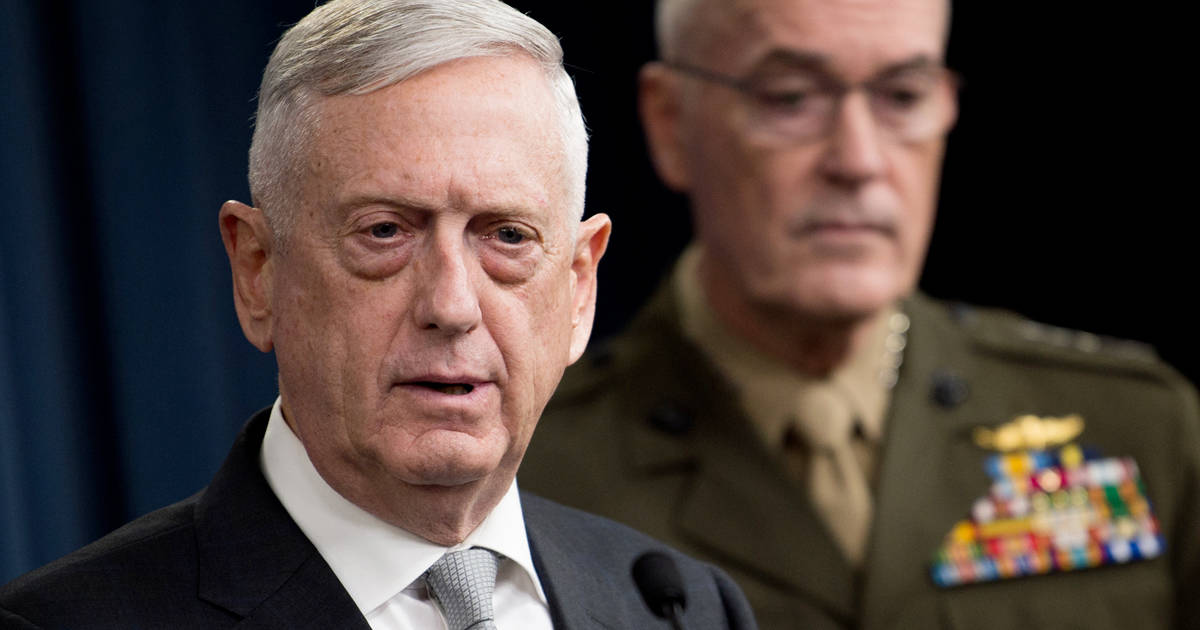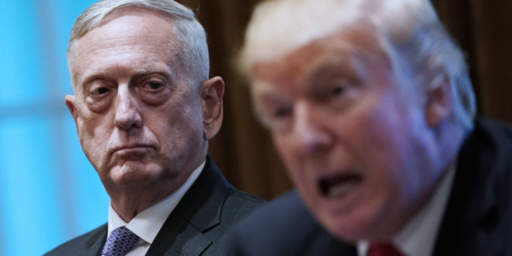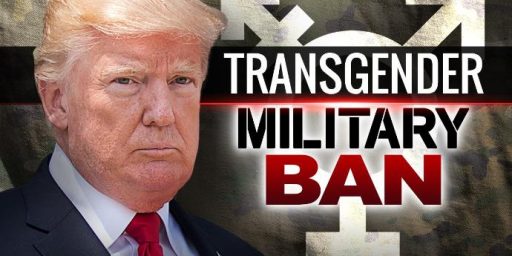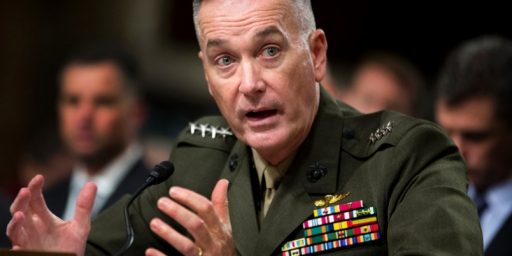It’s Not the Military’s Job to Oppose Trump
My latest for The National Interest.

My latest for The National Interest, “It’s Not the Military’s Job to Oppose Trump,” was published over the weekend.
President Donald Trump’s promise to send large numbers of troops to the southern border to stop the so-called migrant caravan making its way north through Mexico has been, to say the least, controversial. Many have called on Secretary of Defense Jim Mattis to put his foot down on the matter. Some, notably Washington Post foreign affairs columnist David Ignatius, have called for Joint Chiefs chairman Joe Dunford to do the same. This misapprehends the proper role of the military leadership in our society.
While I share the misgivings about using the military to stop unarmed asylum seekers for a variety of reasons beyond the scope of this essay, it is well within Trump’s remit as commander-in-chief of the armed forces to order their deployment for that purpose. Indeed, as Ignatius acknowledges, many other presidents have done so. There are some legal questions about what active duty troops under Title 10 federal authority (as opposed to National Guard soldiers under Title 32 authority) may be asked to do. But, so far as we know, they have so far been asked to perform only unquestionably lawful support functions.
To the extent that Mattis and Dunford disagree with the policy, they owe it to the nation and their President to give their best advice against it. Despite his impulsiveness, Trump has demonstrated that he is persuadable by Mattis in particular. Presuming they have tried and failed to convince the President to reverse course, however, they have two legitimate choices: carry out the order to the best of their ability or resign their posts in protest and continue their fight from the outside.
While I agree with those who argue the deployment is an unseemly “political stunt,” that would seem an odd hill, indeed, to choose to die on. It has been understood from at least the time of Carl von Clausewitz that the military exists to serve political aims. The Joint Staff recently reiterated this, observing in a doctrinal publication that “the strategist must recognize and accept that those policy goals are created within the chaotic and emotional realm of politics” and that therefore “The military professional who believes politics has no place in strategy does not understand the fundamentals of strategy.”
Unless they believe the order unlawful or one that seriously endangers U.S. national security—and it would be difficult to make either argument based on what we know so far of Trump’s plan—Mattis and Dunford are much more valuable inside the room where they can help steer the policy clear of legal and moral pitfalls. While one presumes that Trump’s recent bombast about troops firing their guns at migrants with rocks is mere bluster, ensuring that our policies comport with American values and the laws of armed conflict is a vital role that Mattis and Dunford can and must play.
Dunford, in particular, must appear always above the political fray since he is a uniformed officer. His duty is to render his best military advice to the President, Secretary of Defense, and National Security Council. In private. His public commentary ought to reflect the policy preferences of the elected decision-makers, not his own or those of the brass.
To the extent that the Chairman’s personal views on the matter should be made public while he remains in uniform, it’s the job of the Congress to ask him on the record. That both Houses are currently controlled by the President’s party makes it unlikely they’ll do so.
If the public is unsatisfied with this arrangement, they have another opportunity to weigh in on the matter at the ballot box next Tuesday and again two years after that. It is not the job of the military leadership to override the policy preferences of their elected bosses.
It occurs to me that the piece, written a week ago, may be overtaken by events given that the border deployment was rather clearly a midterm-related stunt. But the principle remains in effect.
The only real pushback I’ve gotten on this is that I’m conflating the role of Mattis, a civilian, and Dunford, a uniformed officer. It’s true that there are differences.
There’s a long body of literature on civil-military relations that put both legal and professional-cultural restraint on what serving—and some, myself included, retired—officers can and should do in dealing with orders from their civilian bosses with which they strongly disagree. Officers don’t make policy; they carry it out. Subsequent to the 1986 Goldwater-Nichols Act and various amendments since, the Chairman of the Joint Chiefs of Staff has a unique role as principal military advisor to the President, the Secretary of Defense, and the National Security Council. So, he’s supposed to offer his best military advice on policy, but the final call goes to his civilian bosses.
Mattis’ role is a political-policy one and he’s under no such strictures. He’s under no obligation whatsoever to follow orders from the President and there is no Constitutional or professional reason he can’t simply resign and oppose Trump whenever he wants.
Still, Mattis is no ordinary civilian—even aside from the fact that he’s a retired general. As Secretary of Defense, he’s part of the military chain of command. So, like Dunford, he should give his orders in private and then either resign or carry them out if he’s overruled.





Well said
The military must have done a bang-up job.
There’s been no mention of the very scary caravan, that was threatening our way of life, since the mid-terms were over.
Shame on Mattis for allowing the military to be used for a blatant political stunt.
Nothing more than the Dennison version of Wag-the-Dog.
Pathetic.
Well, events have been overrun by the recent attempt by a White House intern to deprive Jim Acosta of his god-given right to a White House microphone. The “journalists” will settle down soon and return to regularly scheduled broadcasts already in progress.
I understand the idea that the military should obey the legal orders of the President even if the actions are merely some inane demagoguery. I do wonder if the Secretary of Defense owes primary responsibility to the President or to the USA as a whole. Who decides what constitutes an illegal order by the President? What if the President orders something not illegal but manifestly wrong or stupid; what are the Sec Def’s duties then? The Federal Reserve famously is independent of the Prez which many Presidents have complained about. How independent are cabinet offices?
Wait… so, by the same logic, my strawman suggested that if Trump suddenly decided to enflame some other nonsensical pursuit, like having the troops march to Atlantis to prevent illegal voting by the mermen, we would be ok with troops going off to drown?
The commentary smacks of the support of Authoritarianism.
Nope. Our leader is unstable, and if we have to ensure there are bumpers in the bowling alley of his presidency, people damn well better speak up.
@Slugger:
Geezus, Slugger, where’ve you been the past two years?
At any rate, James is correct: unless an order is unlawful – clearly unlawful – uninformed personnel have a duty to carry out their orders. Four years USN active duty, 15 years Reserve, and 24 years Border Patrol, I’ve not encountered any illegal orders, and few stupid orders. “Wrong” orders are relative to and dependant upon the mission and situation, and fields units adapt to those two dynamics as they change.
Well written and to the point, James.
@JKB:
Actually if you watch the entire exchange, your Dear Leader was trying to deflect Acosta’s question about the scary caravan that had you wetting your pants until three days ago.
Was this ever a question? Military should follow lawful orders.
I don’t understand the rules involving deploying the military domestically, but if they’ve gone to the border to support border enforcement officers in the past (and they have), then it’s pretty likely that this is a lawful order. Given that this has happened before, and that it doesn’t create an immediate danger, even if it was somehow not lawful in this instance, I would rather it be settled in the courts rather than the military simply refusing civilian orders.
I sometimes find James too pedantic and legalistic about this sort of thing, but in this case, yes. Serving military have a legal obligation to carry out lawful orders. I’m not acquainted with the status of retired officers. Civilians in DoD should, of course, push for good policy, but ultimately they serve at the pleasure of the President. They carry out his orders or resign.
There are, of course, two problems with the above. First, if Trunp decided one morning to nuke France, I hope someone would step in, legally or otherwise. Second, no one resigns over principle anymore.
It should also be noted that you can do anything if you’re willing to suffer the consequences. A serving officer can disobey a lawful order if he feels it’s worth the court martial and punishment. In the improbable ticking bomb situation people use to justify widespread torture, if the good guys really thought the bad guy would give it up under waterboarding, I would hope someone would break the law, waterboard, and face the consequences. If you’re gonna be a hero, be a hero.
(I expect the CIA, and the security services of other nations, occasionally kidnapped, expertly interrogated including torture, and quietly disposed of individuals. This was illegal and everyone involved knew it. It only became an issue because Bush and Cheney wanted to do it on a large scale and wanted to be admired for it.)
It’s also not the military’s job to enable bad policies and politics.
If 7000+ people are heading en masse to the morder, then maybe it makes sense to provide additional support to the border patrol (maybe).
That’s not what Trump did. He claimed all sorts of calumnies concerning the migrants, and even said US troops would shoot if they are attacked with rocks. That’s pandering to the xenophobic wing of the Republican party (but that’s redundant), and not the job of the American military at all.
I’m all for civilian oversight and command of the military. But using them as mere props for political agitation and propaganda is plain wrong and no military should put up with it.
It’s Not the Military’s Job to Oppose Obama – LOL
Think about that. Then think about that. Or Trump, or Bush. Me, I’ve met Hillary and no way I’d want her as Commander in Chief – we had a choice of awfuls. We can’t vote none of the above.
@Kathy:
How, precisely, would you wish them to decline to “put up with it”? Refuse a lawful order from the Constitutional commander-in-chief?
A quarter century ago, the U.S. military, especially its officer corps, loathed Bill Clinton. They resented the hell out of him for a variety of reasons and were incensed that, while their budget and force size were being slashed to achieve a post-Cold War “peace dividend,” Clinton had the temerity to order them to do all sorts of things they defined as “Operations Other Than War” and believed to be outside their lane. They nonetheless followed their goddamn orders.
Much more recently, President Obama, who was also rather unpopular among the officer corps, ordered them to allow gays to serve openly and integrate women into the combat arms, including the beloved Infantry. They pushed back as hard as they could within the legal limits. Ultimately, though, they followed their goddamn orders.
That’s as it should be. It’s the job of Congress to check bad Presidential policies and the courts to check unconstitutional ones. For the military to assert their policy preferences here would be a dangerous precedent, indeed.
@James Joyner:
I don’t know, exactly. But there are a myriad options between blind obedience and mutiny. For example, the DoD could put out a press release saying how many troops are moving to the border, in what capacity, and what they’ll be doing.
As I understand it, combat troops can’t be deployed as if for combat domestically, perhaps short of an imminent armed invasion. The Army can say this, too.